Understanding your credit score is essential for managing your finances in Canada. This three-digit number influences your ability to secure loans, credit cards, and even rental agreements. In this guide, we’ll explore what credit scores are, how they’re calculated, and practical steps to improve yours.
What Is a Credit Score?
A credit score is a numerical representation of your creditworthiness, ranging from 300 to 900 in Canada. Lenders use this score to assess the risk of lending you money. The higher your score, the more likely you are to be approved for credit with favourable terms.
Want to learn more about the role of credit cards in managing your finances? Check out our guide on credit cards.
How Is Your Credit Score Calculated?
Credit bureaus like Equifax and TransUnion calculate your score based on several factors:
- Payment History (35%): Timely payments boost your score, while late or missed payments can lower it.
- Credit Utilization (30%): This is the ratio of your current credit balances to your credit limits. Keeping this ratio below 30% is advisable.
- Length of Credit History (15%): A longer credit history can positively impact your score.
- Types of Credit (10%): A mix of credit accounts, such as credit cards, loans, and mortgages, can be beneficial.
- Recent Inquiries (10%): Multiple recent applications for credit can negatively affect your score.
Why Is Your Credit Score Important?
Your credit score affects various aspects of your financial life:
- Loan Approvals: Lenders use your score to decide whether to approve your applications.
- Interest Rates: A higher score can qualify you for lower interest rates, saving you money over time.
- Rental Applications: Landlords may check your credit to assess your reliability as a tenant.
If you’re exploring home financing, read our post on mortgages for more insights.
How to Check Your Credit Score
In Canada, you can check your credit score through:
- Equifax: Offers free access to your credit score and report.
- TransUnion: Provides your credit score and report, though fees may apply.
- Financial Institutions: Some banks offer free credit score monitoring to their customers.
Steps to Improve Your Credit Score
Improving your credit score takes time and consistent effort. Here are some actionable steps:
1. Pay Your Bills on Time
Consistently paying your bills by their due dates is crucial. Consider setting up automatic payments or reminders to avoid missing deadlines.
2. Keep Your Credit Utilization Low
Aim to use less than 30% of your available credit. For example, if your credit limit is $5,000, try to keep your balance below $1,500.
3. Maintain Old Credit Accounts
The length of your credit history matters. Keeping older accounts open, even if unused, can positively impact your score.
4. Limit New Credit Applications
Each application for new credit can result in a hard inquiry, which may lower your score. Apply for new credit only when necessary.
5. Diversify Your Credit Mix
Having a variety of credit types, such as a credit card, car loan, and mortgage, can be beneficial. However, only take on credit you can manage responsibly.
6. Regularly Review Your Credit Report
Check your credit report annually for errors or signs of fraud. If you find inaccuracies, dispute them promptly with the credit bureau.
Need more tips on borrowing responsibly? Discover our advice on borrowing to stay financially secure.
Common Myths About Credit Scores
Let’s debunk some common misconceptions:
- Myth: Checking your own credit score will lower it.
- Fact: Accessing your own credit score is a soft inquiry and does not affect your score.
- Myth: Closing unused credit cards improves your score.
- Fact: Closing accounts can reduce your available credit and shorten your credit history, potentially lowering your score.
- Myth: Carrying a small balance on your credit card boosts your score.
- Fact: Paying off your balance in full each month is more beneficial.
How Long Does It Take to Improve Your Credit Score?
Improving your credit score is a gradual process. Positive changes may start reflecting in a few months, but significant improvements can take a year or more. Consistency is key.
The Role of Credit Scores in Major Financial Decisions
Your credit score plays a pivotal role when making significant financial decisions:
- Buying a Home: Mortgage lenders assess your credit score to determine loan eligibility and interest rates.
- Purchasing a Car: Auto loan providers use your score to set loan terms.
- Starting a Business: A good credit score can help secure business loans or lines of credit.
Conclusion
Understanding and maintaining a healthy credit score is vital for your financial well-being in Canada. By following the steps outlined above, you can improve your credit score and open doors to better financial opportunities.



